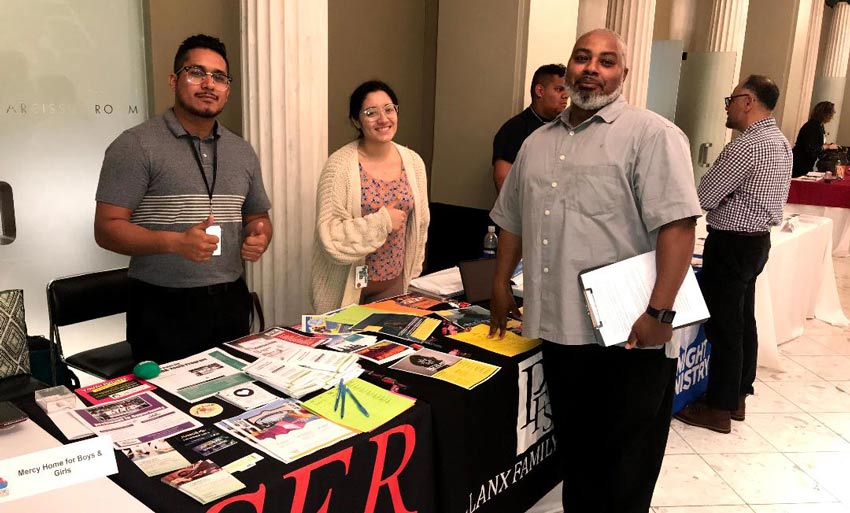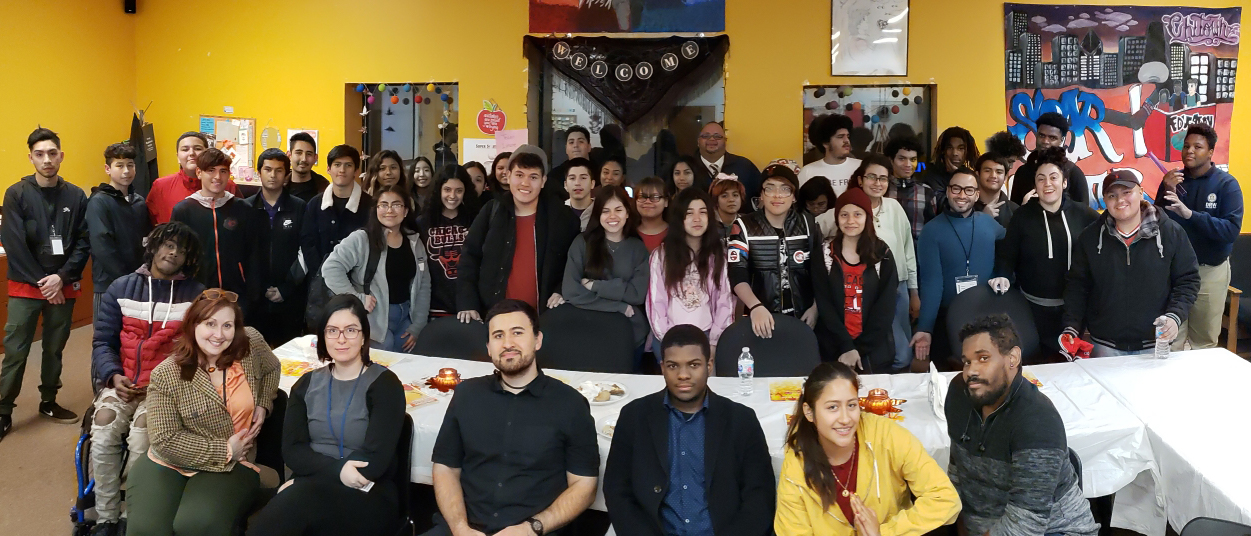Thrive Chicago connects youth-serving nonprofits to coordinate services and share data to help get disconnected youth on track in their communities.
Alicia Martinez’s job is to prevent violence in Chicago’s Little Village neighborhood, an objective that she says requires a holistic approach.
Her nonprofit, Enlace Chicago, was among more than 30 organizations brought together by Thrive Chicago, which concentrates on reconnecting out-of-school and out-of-work young people to education and employment opportunities. The working group came up with an innovative idea: walk-in clearinghouses that provide disconnected youth with links to a range of services to get them on track.
Known as Reconnection Hubs, they are one example of Thrive’s wide-ranging approach to gather, process, and share data while bringing together nonprofit, business, government, education, and philanthropy to address a comprehensive set of needs. One hub is in Little Village; the other in the Roseland neighborhood.
“With the hub, youths get the job support, school support, whatever they need,” said Martinez, Violence Prevention Manager at Enlace, which provides mental health counseling to hub participants. “It’s really great to see. If they are in job training or getting their GED, having the mental health counselor walk with them through their journey and keep them motivated has been really motivating.”
Finding Service Gaps, Creating Stronger Impact
Thrive’s data initiatives aggregate and cultivate data on young people’s life stages, their neighborhoods, and the work of youth-focused organizations. At the same time, the organization has assembled nearly 200 child and youth-serving organizations to collaborate on improving young peoples’ futures.
That structure allows Thrive to shed light on gaps in services for young people and use that information to coordinate the work of multiple organizations. The result is a stronger impact.
Thrive Chicago leverages the collective efforts of youth-serving nonprofits.
Chicago is battling many challenges, said Arne Duncan, a Thrive board member and managing partner of the anti-gun violence organization Creating Real Economic Destiny (CRED). Thrive’s data is a critical start to finding solutions.
“Data never tells the whole truth but also doesn’t lie,” said Duncan, a former U.S. Secretary of Education and Chicago Public Schools (CPS) CEO. “It’s a baseline to try to understand issues, to try and figure out strategies. And, for me, it’s also important to have concrete goals. What are we trying to accomplish? I think that the only way you can do that is to truly understand the data, to share it, to be transparent, and just open up the conversation on those issues.”
Thrive estimates that 50,000 young people are disconnected—out of school or out of work—in Chicago and that funders invest $2 billion a year in more than 300 youth-focused efforts in the metropolitan region.
Yet those efforts reach 15-30 percent of disconnected young people, often referred to as opportunity youth.
One crucial reason is that this group of young people is confused and overwhelmed by the fragmentation of a system designed to help them.
“What we do,” said Dr. Sonya Anderson, Thrive Chicago’s interim president, “is look across the universe of stakeholders who are situated at different points along the continuum and think about how we can design solutions together in a way that incorporates lived experiences with strategy, relationships, and resources to actually move the needle in a community.”
Data guides everything Thrive is attempting to accomplish.
“We use data to identify the areas of need, to devise solutions in response to those areas of need, and then to gut check whether … the things that we are doing have actually addressed those needs,” said Anderson.
One example is the Thrive Data Partnership. In the partnership, more than 30 Chicago youth-serving groups—including United Way, BUILD (Broader Urban Involvement & Leadership Development), Brighton Park Neighborhood Council, and Metropolitan Family Services—have access to youth programming and CPS data.

Coaches from Thrive Reconnection Hubs in Little Village and Roseland recruited participants during an event in 2019 in the Marshall Field and Co. building.
Access to that information, which used to take seven to nine months to obtain, allows the groups to gain immediate insights. Armed with the data, all the entities involved, including CPS, can make quick adjustments to serve current populations.
“One thing I really appreciate about Thrive Chicago and our work with them so far is that they have been able to bring evidence-based practice and expertise to the ground to serve and support the community-based organizations,” said Scott Mengebier, Director of Monitoring, Evaluation and Learning at BUILD Chicago.
Moving Forward Together
In addition to its data work, Thrive began a partnership in 2019 with the nonprofit Youth Guidance. Thrive and Youth Guidance received a $200,000 grant from the Obama Foundation’s My Brother’s Keeper Alliance (MBK), a national effort supporting boys and young men of color to break through barriers to opportunity.
Thrive is the lead convener of an MBK action team collaborative that includes more than 75 groups. The arrangement is designed for youth-serving organizations to expand and deepen programming and create a more effective partnership focused on what boys and young men of color in Chicago need to overcome obstacles to success.
As it looks to the future, one of Thrive’s central goals is expanding and enhancing its data partnership.
While it pursues that and other objectives, Anderson said Thrive will continue to “bring the best of what communities have to offer,” and merge that with nonprofit support to come up with solutions that are authentic, responsive, and sustainable.
“We’re not in it for a short term,” she said, “but really thinking about how we can be true collaborative partners with communities and with our fellow peers in the nonprofit sector to make lasting and systemic change.”
MacArthur provided Thrive $700,000 in support between 2016 and 2018.




